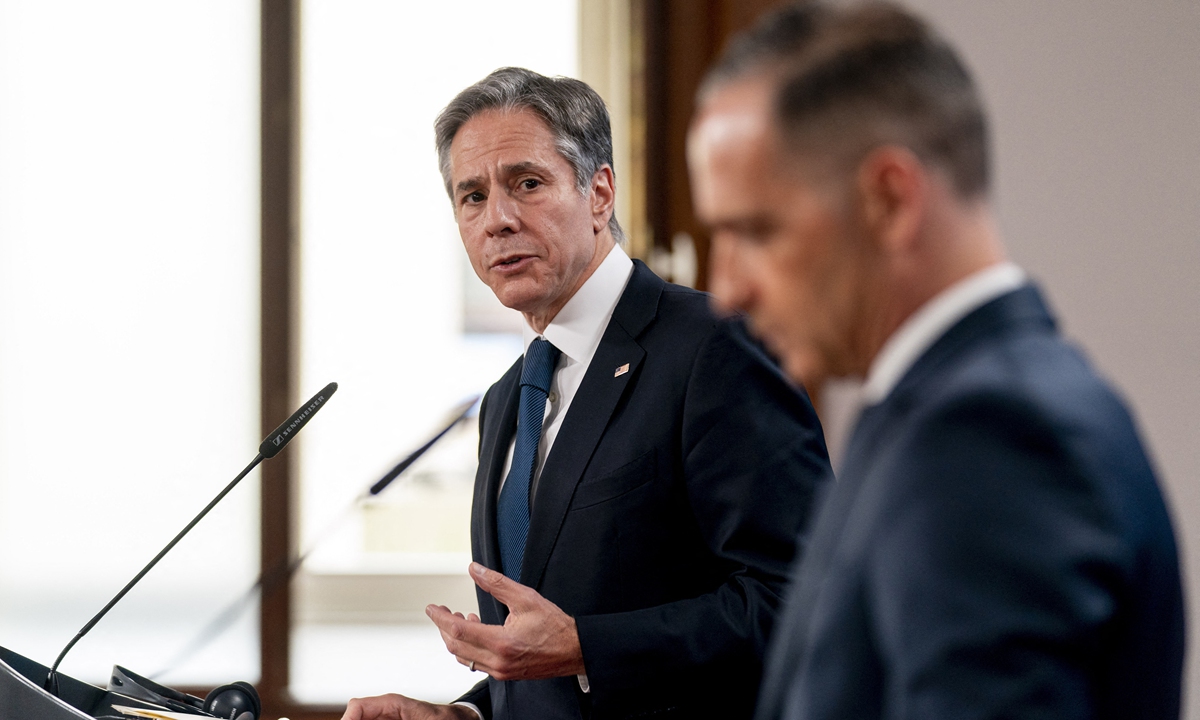
US Secretary of State Antony Blinken (left) addresses a joint press conference with the German Foreign Minister Heiko Maas following talks at the Foreign Ministry in Berlin on Wednesday. Photo: AFP
US Secretary of State Antony Blinken kicked off his Europe trip on Tuesday, less than two weeks after President Joe Biden ended his trip to the continent with an agenda concentrated on countering China.
Analysts predicted containing China will still top Blinken's visit, as they see the Secretary of State's visit is meant to further assuage concerns and pressure, as Europe showed reluctance to tie themselves to the US' anti-China agenda after Biden's visit.
Blinken left Washington on Tuesday afternoon for Berlin, then to Paris and Rome, meeting the European Union's two key power brokers, German Chancellor Angela Merkel and French President Emmanuel Macron, as well as Vatican leaders, AFP reported.
The US has no better partner in the world than Germany, Blinken told reporters before meeting Chancellor Angela Merkel in Berlin on Wednesday, Reuters reported.
Blinken's trip aims to negotiate with its European allies when some European leaders voiced concerns about going against China, Cui Hongjian, director of the Department of European Studies at the China Institute of International Studies, told the Global Times.
After the NATO summit issued a communiqué with a tough stance on China, Merkel said NATO's decision to name China as a threat "shouldn't be overstated" because Beijing, like Russia, is also a partner in some areas.
Similarly, France's President Emmanuel Macron urged the alliance not to let China distract it from what he saw as more pressing issues facing NATO, including the fight against terrorism and security issues related to Russia. "I think it is very important not to scatter our efforts and not to have biases in our relations with China," Macron said.
As Merkel's term ends in September, the attention is fixed on her successor, whether she or he will deviate from Merkel's policy and lean closer to Washington, and turn Germany, or Europe, more hostile toward China.
Germany's Christian Democratic Union on Monday revealed a manifesto describing China as posing "the greatest foreign and security policy challenge today." Yet its leader, Armin Laschet, a leading candidate to succeed Merkel, said recently that "I'm not sure the American president wants to create a new Cold War with China… He has some very strong positions where he shows a competitive attitude [where] we as Europeans can be allies. But if somebody wants to start a new war, that would be the wrong answer."
The change in government will add uncertainty to Germany's relations with China, as well as its position of navigating US-China relations, said He Zhigao, a research fellow at the Institute of European Studies of the Chinese Academy of Social Sciences. Yet he noted that Germany has a stable political system, which keeps its policies stable and continuous, regardless of which party takes office.
The rise of Germany, and integration of Europe in recent years, is more inclined to enhance its strategic autonomy internationally, said analysts, noting that whichever party takes office, sustaining Germany's autonomy, as well as Europe's autonomy, is the ultimate principle.
Days after Biden concluded his trip to Europe, Chinese State Councilor and Foreign Minister Wang Yi held phone calls with Italian Foreign Minister Luigi Di Maio, during which the latter said that Italy hopes to promote the Belt and Road construction with China, strengthen cooperation in energy, industry and third-party markets.
This came after Italian Prime Minister Mario Draghi said at the G7 summit that its cooperation with China on the 'Belt and Road Initiative' will be assessed carefully.
The reverse attitude of Draghi and Di Maio shows Italy's challenging task of seeking a balance of achieving economic prosperity by cooperating with China economically, and reaffirming Italian alliance with Europe and NATO partners, Michele Geraci, former undersecretary of state at the Italian Ministry of Economic Development, told the Global Times.
"The two things are not really in conflict and Italy can successfully do both. The problem is that certain people are, instead, using the geopolitical alliance as an excuse to hurt the Chinese economy, said Geraci, noting that "a weak China will, primarily, hurt our Italian and European companies and, less known, also American companies, a lose-lose situation that we all need to work hard to avoid."
Analysts noted that Italy's dilemma reflected Europe's dilemma during Biden's visit, as they are squeamish about getting dragged by the US into a showdown with China, said Cui, noting that Blinken's visit shows how eager the US wants to rope Europe in and shore up unity against China. Yet such hope may be dashed by the continent seeking an independent diplomacy and its inclination of seeking greater economic cooperation with China.
Even if Germany and Europe have rejoiced in Biden taking office, they disagree on national defense budget sharing and the Nord Stream 2 gas line, not to mention their ties having been frayed during the Trump presidency, said experts.
"The US and Europe are like an estranged couple. Biden and Blinken are trying to fix the cracks, but whether they will succeed remains unknown. A honeymoon is far, far away," said He.




